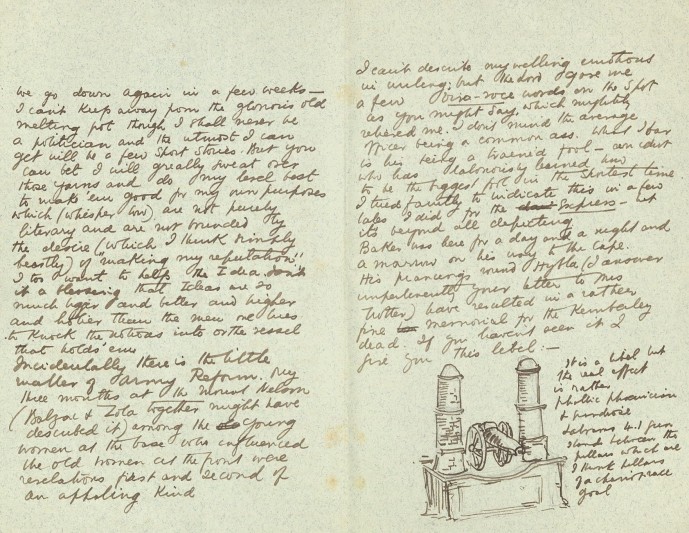Dr Richard Wragg, Collections Senior Manager, writes: The University of Sussex is grateful for the generous support of the FNL in our acquisition of three unpublished letters written by the writer Rudyard Kipling to the journalist and author Edmund Garrett.
Rudyard Kipling and his family made several visits to South Africa between 1898 and 1908 for winter holidays and, whilst there, he was introduced to Edmund Garrett. Garrett had first visited South Africa in the late 1880s and between 1895 and 1899 served as the editor of the influential Cape Times newspaper. During a period of increasing tensions between Great Britain and the South African Republic, Garrett, through his writing, was at the forefront of political debate.
It is likely that shared opinions and inquisitive minds brought Kipling and Garrett together. Both were deeply interested in the political situation in the region and, as documented in one of the letters, maintained a vision of a ‘Federated States of South Africa’ which would sit within the British Empire but have autonomy over governing its affairs, ‘the same as Canada and Australia’. Thus, Kipling’s writing offers an insight into his opinions at a pivotal time for South Africa’s relationship with the United Kingdom as the former moved towards independence, something which was nominally granted by the South Africa Act of 1909.
More broadly, the letters are particularly fascinating for what they reveal about how Kipling sought to engage in the major issues of the day through his published writing. In the letter dated 16 October 1900, he comments that ‘I can’t keep away from the glorious old melting pot though I shall never be a politician and the utmost I can get will be a few short stories, but you can bet I will greatly sweat over those yarns and do my level best to make ‘em good for my own purposes which (whisper now) are not purely literary…’.
Despite their political significance, the letters are not dry but rather lively and good humoured. At one point, Kipling affectionately refers to Garrett’s parody of him, published in The Spectator in August 1904. Kipling shows no irritation or insult but is, instead, pleased that his friend is once again able to publish following a bout of ill health. Through the combination of light-hearted discourse and political commentary, the letters reveal the means through which both men maintained their networks of writers, politicians and thinkers.
The University of Sussex is home to a particularly expansive collection of Rudyard Kipling papers. The new acquired letters will complement existing holdings which frequently mention South Africa and the politics of Empire but which did not, until now, contain correspondence with Edmund Garrett.
